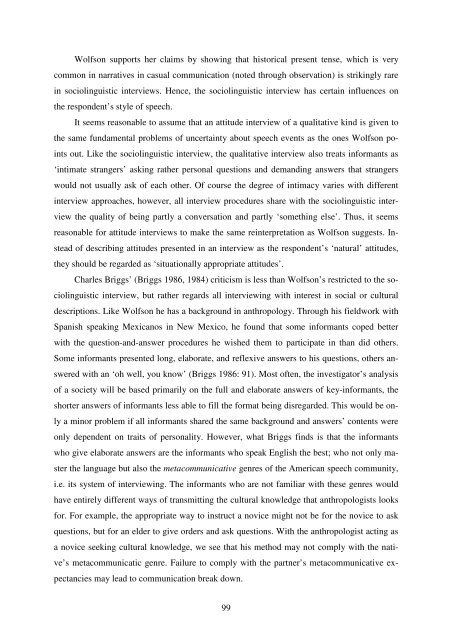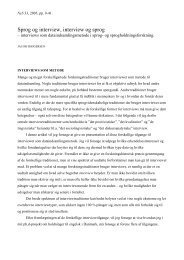Hør dog hvad de siger - Note-to-Self: Trials & Errors
Hør dog hvad de siger - Note-to-Self: Trials & Errors
Hør dog hvad de siger - Note-to-Self: Trials & Errors
You also want an ePaper? Increase the reach of your titles
YUMPU automatically turns print PDFs into web optimized ePapers that Google loves.
Wolfson supports her claims by showing that his<strong>to</strong>rical present tense, which is very<br />
common in narratives in casual communication (noted through observation) is strikingly rare<br />
in sociolinguistic interviews. Hence, the sociolinguistic interview has certain influences on<br />
the respon<strong>de</strong>nt’s style of speech.<br />
It seems reasonable <strong>to</strong> assume that an attitu<strong>de</strong> interview of a qualitative kind is given <strong>to</strong><br />
the same fundamental problems of uncertainty about speech events as the ones Wolfson po-<br />
ints out. Like the sociolinguistic interview, the qualitative interview also treats informants as<br />
‘intimate strangers’ asking rather personal questions and <strong>de</strong>manding answers that strangers<br />
would not usually ask of each other. Of course the <strong>de</strong>gree of intimacy varies with different<br />
interview approaches, however, all interview procedures share with the sociolinguistic inter-<br />
view the quality of being partly a conversation and partly ‘something else’. Thus, it seems<br />
reasonable for attitu<strong>de</strong> interviews <strong>to</strong> make the same reinterpretation as Wolfson suggests. In-<br />
stead of <strong>de</strong>scribing attitu<strong>de</strong>s presented in an interview as the respon<strong>de</strong>nt’s ‘natural’ attitu<strong>de</strong>s,<br />
they should be regar<strong>de</strong>d as ‘situationally appropriate attitu<strong>de</strong>s’.<br />
Charles Briggs’ (Briggs 1986, 1984) criticism is less than Wolfson’s restricted <strong>to</strong> the so-<br />
ciolinguistic interview, but rather regards all interviewing with interest in social or cultural<br />
<strong>de</strong>scriptions. Like Wolfson he has a background in anthropology. Through his fieldwork with<br />
Spanish speaking Mexicanos in New Mexico, he found that some informants coped better<br />
with the question-and-answer procedures he wished them <strong>to</strong> participate in than did others.<br />
Some informants presented long, elaborate, and reflexive answers <strong>to</strong> his questions, others an-<br />
swered with an ‘oh well, you know’ (Briggs 1986: 91). Most often, the investiga<strong>to</strong>r’s analysis<br />
of a society will be based primarily on the full and elaborate answers of key-informants, the<br />
shorter answers of informants less able <strong>to</strong> fill the format being disregar<strong>de</strong>d. This would be on-<br />
ly a minor problem if all informants shared the same background and answers’ contents were<br />
only <strong>de</strong>pen<strong>de</strong>nt on traits of personality. However, what Briggs finds is that the informants<br />
who give elaborate answers are the informants who speak English the best; who not only ma-<br />
ster the language but also the metacommunicative genres of the American speech community,<br />
i.e. its system of interviewing. The informants who are not familiar with these genres would<br />
have entirely different ways of transmitting the cultural knowledge that anthropologists looks<br />
for. For example, the appropriate way <strong>to</strong> instruct a novice might not be for the novice <strong>to</strong> ask<br />
questions, but for an el<strong>de</strong>r <strong>to</strong> give or<strong>de</strong>rs and ask questions. With the anthropologist acting as<br />
a novice seeking cultural knowledge, we see that his method may not comply with the nati-<br />
ve’s metacommunicatic genre. Failure <strong>to</strong> comply with the partner’s metacommunicative ex-<br />
pectancies may lead <strong>to</strong> communication break down.<br />
99



